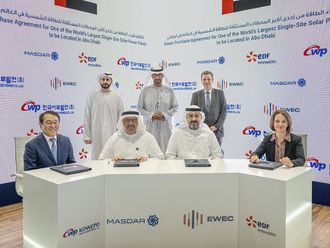London/Arbil: Iraq’s Kurdistan region said on Thursday it expected to begin making regular payments to oil-exporting companies in the first half of September, sending shares in those firms up as high as 17 per cent in early trade.
The Kurdish Ministry of Natural Resources said in a statement that $75-$100 million (Dh275-367 million) of revenue from its direct crude oil sales would be allocated as payment on account to the companies.
The autonomous region has ramped up independent sales since mid-June while cutting allocations to Iraq’s state oil firm SOMO in an escalating dispute over export rights and budget payments that led to companies going unpaid.
“Regular payments will allow the exporting companies to cover their ongoing expenses and plan for further investment in the oilfields, which will in turn boost production,” the statement read.
“As oil export rises in early 2016, the KRG [Kurdistan Regional Government] envisages making additional revenue available to the exporting IOCs [international oil companies] to enable them to begin to catch up on the past receivables due under their production-sharing contracts.” Oil producers across the globe are trying to deal with the financial fallout of a sharp decline in crude prices since last year’s peak in June.
In Kurdistan, that has been compounded by an ongoing row with Baghdad, which slashed funds to the region last year, rendering it unable to pay its own employees’ salaries, let alone oil company dues.
Shares in Genel opened 17 per cent higher, Gulf Keystone Petroleum was up 7 per cent, and Norway’s DNO 10 per cent after the statement.
Gulf Keystone’s Chief Executive Jon Ferrier said he was “very encouraged” by the announcement: “We need a regular payment cycle to ensure our commercial sustainability and to further develop the world-class Shaikan field. Today’s news marks a promising start to that process.” Gulf Keystone said on Thursday it was owed $283 million for oil sales and other costs from the KRG.
June was the first month of large independent sales since December last year, when Kurdistan reached a deal with Baghdad to contribute 550,000 barrels per day (bpd) to Iraq’s oil exports in 2015 in return for reinstated budget payments.
An average of 516,745 bpd was exported from the Kurdistan region in July via pipeline to the Mediterranean port of Ceyhan in Turkey, but only 71,017 bpd was transferred to SOMO.












